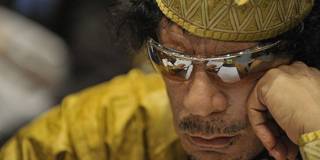The recent coup attempt in Libya has finally pierced the illusion that the dysfunctional central government can rule effectively. It also confronts the country's leaders – and their Western benefactors – with the need to consider the legacy of Muammar el-Qaddafi’s four decades in power.
ANTALYA – The recent coup attempt in Libya, led by General Khalifa Hiftar, has finally pierced the illusion that the country’s dysfunctional central government, whose power is limited to the capital, Tripoli, can rule effectively. But determining how to bring peace and stability to Libya’s deeply fragmented society will require more than an assessment of this government’s mistakes; it will demand careful consideration of former leader Colonel Muammar el-Qaddafi’s failures – and his successes.

ANTALYA – The recent coup attempt in Libya, led by General Khalifa Hiftar, has finally pierced the illusion that the country’s dysfunctional central government, whose power is limited to the capital, Tripoli, can rule effectively. But determining how to bring peace and stability to Libya’s deeply fragmented society will require more than an assessment of this government’s mistakes; it will demand careful consideration of former leader Colonel Muammar el-Qaddafi’s failures – and his successes.